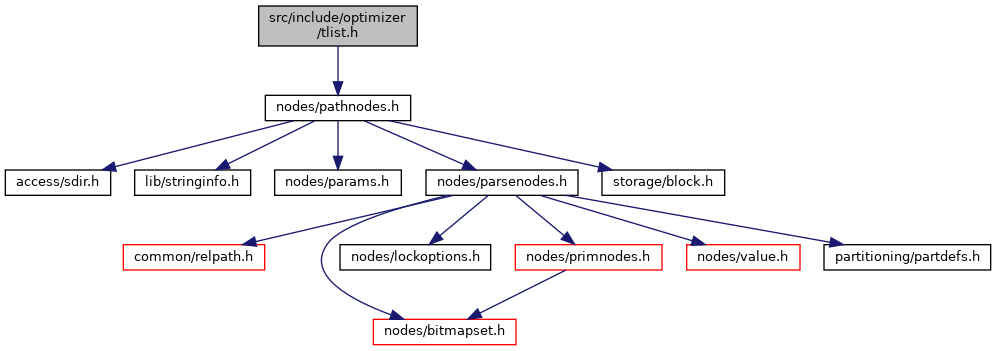#include "nodes/pathnodes.h"

Go to the source code of this file.
Macros | |
| #define | create_pathtarget(root, tlist) set_pathtarget_cost_width(root, make_pathtarget_from_tlist(tlist)) |
Macro Definition Documentation
◆ create_pathtarget
| #define create_pathtarget | ( | root, | |
| tlist | |||
| ) | set_pathtarget_cost_width(root, make_pathtarget_from_tlist(tlist)) |
Function Documentation
◆ add_column_to_pathtarget()
|
extern |
Definition at line 704 of file tlist.c.
References PathTarget::exprs, fb(), PathTarget::has_volatile_expr, lappend(), list_length(), palloc0(), repalloc(), VOLATILITY_NOVOLATILE, and VOLATILITY_UNKNOWN.
Referenced by add_new_column_to_pathtarget(), add_sp_item_to_pathtarget(), create_one_window_path(), create_rel_agg_info(), init_grouping_targets(), make_group_input_target(), make_partial_grouping_target(), make_sort_input_target(), and make_window_input_target().
◆ add_new_column_to_pathtarget()
|
extern |
Definition at line 750 of file tlist.c.
References add_column_to_pathtarget(), PathTarget::exprs, and list_member().
Referenced by add_new_columns_to_pathtarget(), and init_grouping_targets().
◆ add_new_columns_to_pathtarget()
|
extern |
Definition at line 761 of file tlist.c.
References add_new_column_to_pathtarget(), fb(), and lfirst.
Referenced by add_paths_with_pathkeys_for_rel(), make_group_input_target(), make_partial_grouping_target(), make_sort_input_target(), and make_window_input_target().
◆ add_to_flat_tlist()
Definition at line 141 of file tlist.c.
References copyObject, fb(), lappend(), lfirst, list_length(), makeTargetEntry(), and tlist_member().
Referenced by build_tlist_to_deparse(), and foreign_grouping_ok().
◆ apply_pathtarget_labeling_to_tlist()
|
extern |
Definition at line 783 of file tlist.c.
References elog, ERROR, PathTarget::exprs, fb(), i, IsA, lfirst, tlist_member(), and tlist_member_match_var().
Referenced by create_projection_plan(), and create_scan_plan().
◆ apply_tlist_labeling()
Definition at line 327 of file tlist.c.
References Assert, fb(), forboth, lfirst, and list_length().
Referenced by clean_up_removed_plan_level(), create_modifytable_plan(), and create_plan().
◆ copy_pathtarget()
|
extern |
Definition at line 666 of file tlist.c.
References PathTarget::exprs, fb(), list_copy(), list_length(), makeNode, and palloc().
Referenced by add_paths_with_pathkeys_for_rel(), apply_scanjoin_target_to_paths(), create_one_window_path(), create_partitionwise_grouping_paths(), create_unique_paths(), and reparameterize_path_by_child().
◆ create_empty_pathtarget()
|
extern |
Definition at line 690 of file tlist.c.
References makeNode.
Referenced by build_child_join_rel(), build_join_rel(), build_simple_rel(), create_rel_agg_info(), fetch_upper_rel(), make_group_input_target(), make_partial_grouping_target(), make_sort_input_target(), make_window_input_target(), and split_pathtarget_at_srfs_extended().
◆ extract_grouping_collations()
Definition at line 498 of file tlist.c.
References exprCollation(), fb(), get_sortgroupclause_tle(), lfirst, list_length(), and palloc_array.
Referenced by create_agg_plan(), create_group_plan(), and create_groupingsets_plan().
◆ extract_grouping_cols()
|
extern |
Definition at line 523 of file tlist.c.
References fb(), get_sortgroupclause_tle(), lfirst, list_length(), and palloc_array.
Referenced by create_agg_plan(), and create_group_plan().
◆ extract_grouping_ops()
Definition at line 472 of file tlist.c.
References Assert, SortGroupClause::eqop, fb(), lfirst, list_length(), OidIsValid, and palloc_array.
Referenced by create_agg_plan(), create_group_plan(), and create_groupingsets_plan().
◆ get_tlist_exprs()
Definition at line 172 of file tlist.c.
References fb(), lappend(), lfirst, and NIL.
Referenced by build_setop_child_paths().
◆ grouping_is_hashable()
Definition at line 569 of file tlist.c.
Referenced by create_final_distinct_paths(), create_grouping_paths(), create_partial_distinct_paths(), generate_grouped_paths(), generate_nonunion_paths(), generate_recursion_path(), and generate_union_paths().
◆ grouping_is_sortable()
Definition at line 549 of file tlist.c.
References fb(), lfirst, and OidIsValid.
Referenced by adjust_foreign_grouping_path_cost(), create_final_distinct_paths(), create_grouping_paths(), create_partial_distinct_paths(), generate_grouped_paths(), generate_nonunion_paths(), generate_union_paths(), make_pathkeys_for_window(), and standard_qp_callback().
◆ make_pathtarget_from_tlist()
|
extern |
Definition at line 600 of file tlist.c.
References PathTarget::exprs, fb(), PathTarget::has_volatile_expr, i, lappend(), lfirst, list_length(), makeNode, palloc(), and VOLATILITY_UNKNOWN.
◆ make_tlist_from_pathtarget()
|
extern |
Definition at line 633 of file tlist.c.
References PathTarget::exprs, fb(), i, lappend(), lfirst, makeTargetEntry(), and NIL.
Referenced by build_setop_child_paths(), create_unique_paths(), generate_grouped_paths(), and set_subquery_pathlist().
◆ split_pathtarget_at_srfs()
|
extern |
Definition at line 845 of file tlist.c.
References fb(), root, and split_pathtarget_at_srfs_extended().
Referenced by grouping_planner().
◆ split_pathtarget_at_srfs_grouping()
|
extern |
Definition at line 868 of file tlist.c.
References fb(), root, and split_pathtarget_at_srfs_extended().
Referenced by grouping_planner().
◆ tlist_member()
|
extern |
Definition at line 88 of file tlist.c.
References equal(), fb(), and lfirst.
Referenced by add_to_flat_tlist(), apply_pathtarget_labeling_to_tlist(), build_remote_returning(), create_nestloop_plan(), create_unique_paths(), preprocess_targetlist(), rebuild_fdw_scan_tlist(), and search_indexed_tlist_for_non_var().
◆ tlist_same_collations()
Definition at line 291 of file tlist.c.
References exprCollation(), fb(), lfirst, lfirst_oid, list_head(), and lnext().
Referenced by recurse_set_operations().
◆ tlist_same_datatypes()
Definition at line 257 of file tlist.c.
References exprType(), fb(), lfirst, lfirst_oid, list_head(), and lnext().
Referenced by is_simple_union_all_recurse(), and recurse_set_operations().
◆ tlist_same_exprs()
Definition at line 227 of file tlist.c.
References equal(), fb(), forboth, lfirst, and list_length().
Referenced by apply_scanjoin_target_to_paths(), change_plan_targetlist(), and create_projection_plan().